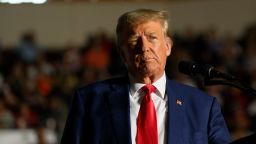Federal prosecutors who’ve brought the 2020 election interference criminal case against Donald Trump are seeking to start to the trial on January 2, 2024, days before the anniversary of the attack on the US Capitol and the Iowa caucuses.
The special counsel’s office said in a filing Thursday that its presentation of evidence in the trial would take “no longer than four to six weeks,” meaning that Trump may need to spend his weekdays in court before a jury in the crucial first two months of a presidential election year, as primary voting begins for Republicans.
“A January 2 trial date would vindicate the public’s strong interest in a speedy trial – an interest guaranteed by the Constitution and federal law in all cases, but of particular significance here, where the defendant, a former president, is charged with conspiring to overturn the legitimate results of the 2020 presidential election, obstruct the certification of the election results, and discount citizens’ legitimate votes,” prosecutors wrote.
They also propose to have jury selection done in December, before the winter holidays.
Trump objected to the proposal in a Truth Social post, saying any trial in the cases against him should wait until after the presidential election.
“Such a trial, which should never take place due to my First Amendment Rights, and massive BIDEN CORRUPTION, should only happen, if at all, AFTER THE ELECTION. The same with other Fake Biden Indictments. ELECTION INTERFERENCE!”
The Iowa caucuses are scheduled for January 15.
Judge Tanya Chutkan of the federal court in Washington, DC, ultimately will decide the trial start date, a decision she is likely to make by the end of this month.
Trump’s team won’t need to submit its formal response until next week. But in Trump’s other federal case related to classified records in Florida after his presidency, they wanted a trial to be put off until after the presidential election. That trial date has been set for May, and Trump has other trial dates in lawsuits and a New York criminal case related to his business records set throughout the first half of next year.
The January 6 federal case may ultimately be a quicker road to trial than the Florida federal documents case, given that Trump is the only defendant at this time and much of what’s charged in the indictment is already public and not classified.
Prosecutors say that Trump “was determined to remain in power” after losing the 2020 election, and that he and six unindicted co-conspirators orchestrated a plot to overturn the results on and leading up to January 6, 2021. He has pleaded not guilty to all charges.
The special counsel’s office also said it is ready to turn over “the majority” of evidence it has collected to Trump’s legal team for their trial preparations. That would include grand jury transcripts, witness interview records, evidence gathered through search warrants and information obtained from the US Secret Service as well as the House select committee that investigated the January 6, 2021, attack on the US Capitol.
Trump’s team has already signaled they plan to raise legal challenges in the case related to the First Amendment and the presidency.
Evidence may include ‘small amount’ of classified information
Smith’s office flagged that the evidence may include a “small amount” of classified information, a development that adds a layer of complexity to the pre-trial process.
Prosecutors stressed that any extra steps that need to be taken under the Classified Information Procedures Act – which sets out the protocols for resolving how classified material can be used in public court cases – should not derail the proposed trial date.
They asked Chutkan to discuss the matter on August 28, when a hearing in the case is already scheduled. They emphasized that the amount of classified information that may be subject to discovery is “minimal” and noted that one of Trump’s attorneys has already received an interim security clearance.
How to handle the classified materials in the separate, Mar-a-Lago documents prosecution that Smith brought against Trump has already become a sticking point in that case, which is unfolding in Florida.
The parties are still dueling over what rules should be imposed on the defendants for accessing the classified evidence – which is an early step in the CIPA process and one that must be resolved before production of classified discovery begins.
US District Judge Aileen Cannon, the judge in the documents case, built in several weeks in the case’s schedule for resolving that dispute. Chutkan, however, has so far signaled she intends to move very quickly in settling certain disagreements between the parties.
This story has been updated with additional details.






